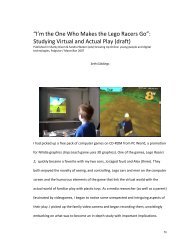- Page 1 and 2: Walkthrough: videogames and technoc
- Page 3 and 4: Table of contents ABSTRACT.........
- Page 5 and 6: methods............................
- Page 7 and 8: Figure 28: Wolfenstein 3D (1992); D
- Page 9 and 10: RTS: real-time strategy. Videogame
- Page 11 and 12: I try instead to explore the gamewo
- Page 13 and 14: old and new media studies The brief
- Page 15 and 16: materiality of both new media and t
- Page 17 and 18: disciplines and boundary work game
- Page 19 and 20: premise that technology, especially
- Page 21 and 22: uses and meanings of consumer devic
- Page 23 and 24: terminology is indicative of the co
- Page 25 and 26: As Roger Silverstone argues here, t
- Page 27 and 28: made then between ‘technoculture
- Page 29 and 30: e integral. The final section coins
- Page 31 and 32: communication, identity formation a
- Page 33 and 34: system; this learning is mechanical
- Page 35 and 36: study of everyday technoculture mig
- Page 37 and 38: need to be developed? Taking the ga
- Page 39 and 40: Part 1: studying videogames, new me
- Page 41 and 42: 1.1: anxious objects - videogames i
- Page 43 and 44: Figure 4: Doom (1993) Whilst there
- Page 45 and 46: of videogames’ also makes totalis
- Page 47: Consalvo has found that the notion
- Page 51 and 52: (Miles 1999: 307). Espen Aarseth’
- Page 53 and 54: virtuality, but say very little abo
- Page 55 and 56: and home computers (Levy 1994) and
- Page 57 and 58: to bring digital spaces and dramas
- Page 59 and 60: So, whilst this section will rehear
- Page 61 and 62: ‘Cyberspace and the worlds we liv
- Page 63 and 64: accordance with the producers’ de
- Page 65 and 66: Figure 7: instrumental fantasy: one
- Page 67 and 68: Every electronic media product laun
- Page 69 and 70: determining technology That technol
- Page 71 and 72: use); the cultural traditions of fu
- Page 73 and 74: Yet there are resonances across thi
- Page 75 and 76: Alluquere Roseanne Stone asks 'what
- Page 77 and 78: presentations of self in the playfu
- Page 79 and 80: them, for self-exploration. Compute
- Page 81 and 82: however be divided into three (over
- Page 83 and 84: The cyborg has generated substantia
- Page 85 and 86: 1.4 play, media & everyday life Pla
- Page 87 and 88: ules of the game: ludus and paidia
- Page 89 and 90: what do games mean? The place of ga
- Page 91 and 92: The pleasures of play derive direct
- Page 93 and 94: Part 1 summary, problems and questi
- Page 95 and 96: Part 2: playing the game The ethnog
- Page 97 and 98: are concerned, at least in part, wi
- Page 99 and 100:
detail and texture of any specific
- Page 101 and 102:
This last point is clearly signific
- Page 103 and 104:
For Sam, part of the challenge of t
- Page 105 and 106:
Entertainment System game published
- Page 107 and 108:
These examples also highlight the s
- Page 109 and 110:
Bug’s Life, Buzz Lightyear). He a
- Page 111 and 112:
of more open-ended driving, explori
- Page 113 and 114:
immersive world is ‘immediate’
- Page 115 and 116:
emergent play As indicated earlier,
- Page 117 and 118:
The car / avatar would begin at the
- Page 119 and 120:
Figure 15: virtual and actual gamew
- Page 121 and 122:
competition. The race over, they be
- Page 123 and 124:
Figure 19: playing the Player, usin
- Page 125 and 126:
one hand this is neither the ‘cyb
- Page 127 and 128:
(of objects by subjects) or identif
- Page 129 and 130:
studies. ANT has been applied to th
- Page 131 and 132:
encoding - decoding Hall’s discus
- Page 133 and 134:
� frameworks of knowledge ……
- Page 135 and 136:
material media Yet in so doing we s
- Page 137 and 138:
Part 1.4. ‘Emergent’ or open-en
- Page 139 and 140:
esisted, indeed they seem illusory,
- Page 141 and 142:
evident in the politics of contempo
- Page 143 and 144:
What about fast-forwarding to a fav
- Page 145 and 146:
Issue Affordances Constraints 1 Fre
- Page 147 and 148:
3.2: augmenting Media Studies It is
- Page 149 and 150:
McLuhan's ideas are idealist and id
- Page 151 and 152:
the critique of the critique of tec
- Page 153 and 154:
a technical system like an electric
- Page 155 and 156:
already identified (SST in particul
- Page 157 and 158:
nonhuman node in this circuit then
- Page 159 and 160:
Both solutions so far are made up o
- Page 161 and 162:
hand, and technologies and artefact
- Page 163 and 164:
STS has had an oblique influence on
- Page 165 and 166:
conclusion: from anthropology of te
- Page 167 and 168:
lieutenants, hybrids and cyborgs. P
- Page 169 and 170:
planes and ships. Most battles requ
- Page 171 and 172:
simulation will be discussed in mor
- Page 173 and 174:
argument is straightforward: narrat
- Page 175 and 176:
Figure 29: the platform ‘genre’
- Page 177 and 178:
critical analysis of these games. I
- Page 179 and 180:
a manual for Doom but the maps are
- Page 181 and 182:
The concept of the cybertext focuse
- Page 183 and 184:
During the cybertextual process, th
- Page 185 and 186:
Figure 36: Adventure (c.1976) The f
- Page 187 and 188:
Figure 37: “a generalized concept
- Page 189 and 190:
contemporary technoculture (a brief
- Page 191 and 192:
Figure 38: Gran Turismo 4 (2005) Wh
- Page 193 and 194:
that allows prediction and visualis
- Page 195 and 196:
Such map-worlds are, to repurpose B
- Page 197 and 198:
J: Of course not - it’s the compu
- Page 199 and 200:
So this intentionality does not ass
- Page 201 and 202:
And later, This behavior must chall
- Page 203 and 204:
Wars 2 has a more complex set of ru
- Page 205 and 206:
findings In Part 3 conceptual and m
- Page 207 and 208:
Part 4: Videogame/play/ers After Pa
- Page 209 and 210:
4.1 avatars: from identification to
- Page 211 and 212:
components (including their players
- Page 213 and 214:
Lara Croft the vehicle Figure 47: a
- Page 215 and 216:
as vehicles, and various hybrids of
- Page 217 and 218:
VICTORY MARCH: Foot soldiers receiv
- Page 219 and 220:
different about the relationship be
- Page 221 and 222:
Aarseth, O’Riordan is careful to
- Page 223 and 224:
configuring the player ‘user conf
- Page 225 and 226:
of performances is analogous to the
- Page 227 and 228:
agency to technologies. A priori as
- Page 229 and 230:
significant. The racetrack as ludot
- Page 231 and 232:
around their circuit and up and ove
- Page 233 and 234:
Agency is translated conceptually a
- Page 235 and 236:
at which Jo/Lego man/car is broken
- Page 237 and 238:
part(icipant)s and object positions
- Page 239 and 240:
Epilude: a programme for New Media
- Page 241 and 242:
media event populated by screen ima
- Page 243 and 244:
axis unsettle established categorie
- Page 245 and 246:
Ludography Games referenced in this
- Page 247 and 248:
Filmography Cannon Fodder dir. Otom
- Page 249 and 250:
Bassett, Caroline 1997, Virtually g
- Page 251 and 252:
Cockburn, Cynthia & Furst Dilic, Ru
- Page 253 and 254:
Flanagan, Mary 1999, Mobile identit
- Page 255 and 256:
Haraway, Donna 2004, The Haraway Re
- Page 257 and 258:
Kember, Sarah 2006, Creative evolut
- Page 259 and 260:
Mackenzie, Adrian 2005, The perform
- Page 261 and 262:
Nunes, Mark 1997, What space is cyb
- Page 263 and 264:
Schroeder, Ralph 1995, Virtual envi
- Page 265 and 266:
Tomlinson, Alan (ed.) 1990, Consump
- Page 267:
Appendix: statement of authorship o




